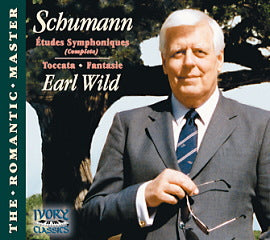Earl Wild: Schumann piano music
Earl Wild: Schumann piano music
Couldn't load pickup availability
Ivory Classics CD-71001
Earl Wild: Schumann
Piano: Earl Wild
Producer: Michael Rolland Davis
Engineer: Ed Thompson
Piano: Baldwin
(DDD)
Recorded at Queen Elizabeth Hall, London on September 19, 1974,
and at Fernleaf Abbey, Columbus, Ohio on October 2 & 3, 1990
Remastered using 24-Bit State-of-the-Art Technology - HDCD Encoded
If one were to list some of the supreme masterpieces of piano literature, Schumann's Fantasia in C Major, Opus 17 would be in that Pantheon. Every marvelous page contains the full measure of Schumann's passion. His Etudes Symphoniques, Opus 13 (complete with five posthumous variations) is also a rich, glowing, intensely personal musical work. Here the highly difficult and devilishly virtuosic Toccata, Opus 7, was taken from a live performance. These three great piano works are performed by the Romantic Master of the piano, Grammy® award winner Earl Wild.
Disc.Reviews
It's extraordinary to think that Wild, in 1939 the first artist to give a televised piano recital in the US, should, nearly 60 years later, have been the first to appear live on the internet. Wild has often been mentioned in the same breath as Rachmaninov, Lhevinne, and Rosenthal, and certainly, there is an unmistakable sense of the Romantic tradition in his mastery. Wild began his 1974 London recital with a performance of the Toccata from which this present performance was taken. There is much to enjoy on this disc.
International Record Review, Aug. 2001
Earl Wild's polished and insightful performance of the Toccata in C is quite simply one of the most musically cogent readings of the work ever to have been put on disc. Wild always makes everything something of a personal odyssey, and ever the keen ear for the inner voice, his Etudes Symphoniques and Fantasie are rewardingly seasoned. The sense of harmonic timing throughout is exemplary. This disc's a peach.
MDC - London, Nov. 2000
Earl Wild, an unbelievable 85 this year, has had a curious career. That he is, even today, a virtuoso of formidable accomplishments is commonly granted by even his sternest critics, and his inclusion in Philips's gargantuan Great Pianists of the 20th Century was a source of great satisfaction to his many fans. There are many beauties to savor here - long-spanned melodic arches which remind us that Schumann the lyricist was one of the greatest songwriters ever, tightly sprung rhythms of great excitement, the deftly illumined polyphony, the beautiful harmonic balance, and much more. Four stars.
BBC Music Magazine, Oct. 2000
Earl Wild devises a novel ordering of Schumann's Symphonic Etudes, recorded here complete with the five posthumous variations. The lyrical movements capture Wild in an expansive, flexible frame of mind and hand while the live 1974 Toccata reveals Wild taking great chances with this knuckle buster. He underlines Schumann's contrapuntal implications without puncturing the gnarly textures and packs quite a punch as he speeds up for the chordal climax.
Classics Today, Sep. 2000
Wild's masterly playing of the Schumann Symphonic Etudes and the Fantasy, Opus 17, is a supreme example of an almost extinct brand of golden-age piano playing. A contemporary of the late Shura Cherkassky and Jorge Bolet, the 84-year-old Wild offers pianism that excels in the interpretive succinctness, personal tone-painting, and technical wizardry of both of them. His Etudes are characterized by compelling musicality, poetic astuteness and breathtaking virtuosity. More importantly, a sense of continuity, of narrative, ties these disparate items together. The Fantasy unfolds with elegance and fury, a musical epic beautifully delineated. The Toccata is playful and authoritative.
Los Angeles Times, Jul. 2000
Everything on this disc is played with Earl Wild's customary brilliance and pace - its all very exciting. There is always an infectious zest to Wild's playing and it is evident and enjoyable here.
American Record Guide, Jun. 2000
Earl Wild at his very best, warm and spontaneous. Four stars.
Classic CD, Jun. 2000
White-haired but unlined, handsome and regal, Wild in his mid-seventies on this disc, maintains the look of a dignified, confident master and his playing underscores that appearance. Wild made an excellent impression a few years ago in Beethoven's 'Hammerklavier' Sonata, with a solid musical approach as well as the expected technical mastery. The Schumann Toccata here is, of course, an enormously demanding work and Wild plays through it with note-perfect accuracy and brilliance. Wild negotiates the thorny difficulties of the Etudes Symphonique with great ease but the Fantasie is the highlight of this CD.
Fanfare Magazine, Jun. 2000
Hearing this disc of virtuoso pieces by Schumann, the listener might never imagine that the notes coming from his or her speakers were being produced by a man in his eighties. Nevertheless, Earl Wild, at 85, has produced performances with all the technical dexterity of a youngster with a maturity and profundity that can only come with age. To say that the 1997 Grammy award-winning Wild performs this piece and the Etudes Symphonique on this album well would be an understatement. His dynamic contrasts and colors are incredible. He tosses off treacherous octave passages with aplomb. In his hands, music is heard as one long moment, in part due to a mastery of bringing out the inner voices-chiseling out the 'line' - regardless of technical difficulty. The younger generation of pianists will be well served by listening to this legend.
Classical Music, Jun. 2000
Earl Wild (b. 1915) is something of an atavism, a throwback to the Romantic era and its 'marathon' conception of keyboard virtuosity, a performer and arranger much in the style of Liszt, Rubinstein and Thalberg, whose level of technical execution has remained consistently brilliant for sixty-five years. The Toccata here is vintage Wild, a thrilling ride as Schumann conceived it, a perpetual-motion machine in agog of accents and torrential syncopation. The Etudes Symphonique are indeed 'symphonic', full-blooded harmonically and rife with colored, chromatic chords in endless permutations. But he pulls out all the stops for the Fantasie in C, that hyper-Romantic canvas conceived along the lines of Beethoven and Schubert, with its huge rhetorical phrases, anagrams, and sweeping gestures.
Audiophile Audition, May. 2000


